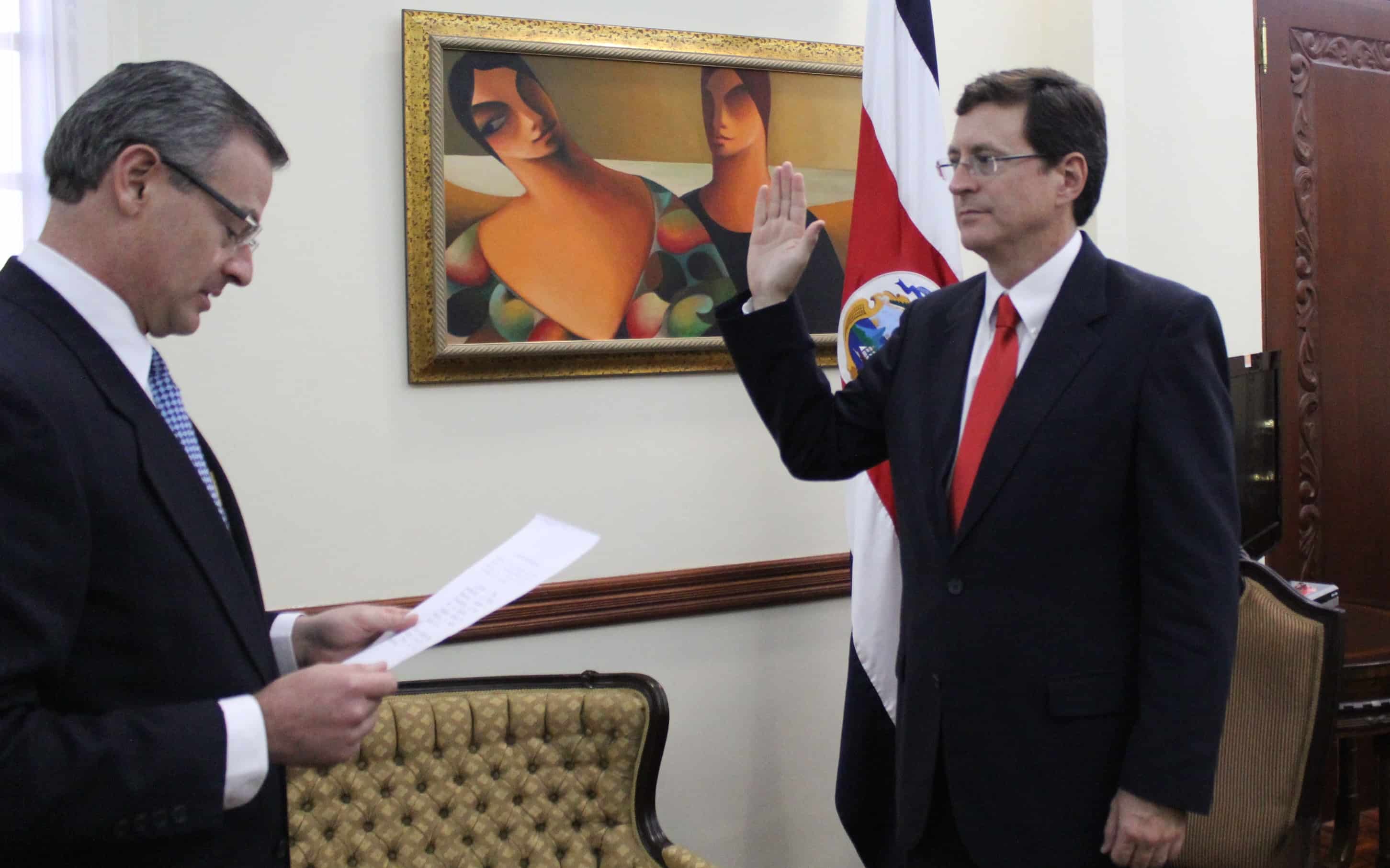Román Macaya was sworn in as Costa Rica’s new ambassador to the United States Wednesday morning in a ceremony at the Casa Amarilla in San José. The new ambassador will have to find a way to get Costa Rica’s voice heard in the Beltway and beyond at a time when a child immigration emergency in Central America and other global crises may drown out the concerns of the small, stable democracy.
President Luis Guillermo Solís appointed Macaya, a 47-year-old businessman who holds a doctorate in biochemistry from the University of California, Los Angeles, on Tuesday during his weekly press conference at Casa Presidencial. The president said he asked Macaya to prioritize foreign investment and educational tourism as some of his top priorities when he arrives in Washington, D.C.
In an interview with The Tico Times, Macaya said the child migrant crisis along the southwest U.S. border would be another area of focus as he transitions into his new job. Costa Rica has been largely absent from discussions about the issue. An estimated 90,000 unaccompanied minors will trek to the U.S. border, mostly from Honduras, Guatemala and El Salvador, by the end of 2014. Macaya said Costa Rica needs to play an active role in the debate and how to address the crisis at its roots.
The new ambassador said the current focus of many U.S. lawmakers to increase security along the border could have troubling results for Costa Rica. Macaya observed that if it becomes too difficult to cross the border, many migrants may start to look south to Costa Rica, which already receives more immigrants looking for work than any other Central American country.
“We don’t need 90,000 child migrants, we only need 5,000 migrants for our [immigration] system to start to collapse,” Macaya said in a telephone interview.
“Central America needs integral solutions to violence, drug and human trafficking and gangs” beyond simply locking down borders, Macaya said.
As dysfunction reaches new depths in Washington and hotspots flare around the globe, pushing the agenda of a small partner like Costa Rica will be a challenge for the biochemist. Macaya said he would emphasize the countries’ shared values of democracy, human rights, liberty and pursuit of prosperity for future generations as a way to build leverage.
“That leverage comes from shared values of democracy, human rights, liberty and pursuit of prosperity for future generations,” Macaya said, “There are countries with bigger markets or problems that affect the U.S., but Costa Rica offers a stable society with common values. … A country is more than its economy.”
But the economy remains a major priority for Macaya, who came under criticism from some Costa Ricans about how his previous opposition to the Central American Free Trade Agreement might negatively affect his new post. Macaya is hardly alone when it comes to former critics of CAFTA in the current administration, which include President Solís and many other Citizen Action Party members.
“Being opposed to CAFTA is not equivalent to being anti-U.S. by any stretch of the imagination. CAFTA is what we’ve got to work with, including this ambassador,” he said.
Regardless of his stance on the free trade agreement, Macaya’s U.S. mother from Boston is likely a stronger argument for his affection for the United States. Macaya studied and worked in the U.S. for 14 years after graduating high school in Costa Rica. He recently gave up his dual citizenship with the U.S. to accept the post as Costa Rica’s ambassador. In addition to studying at UCLA, Macaya received a master’s degree from the Wharton School of Business at the University of Pennsylvania.
Before his nomination as ambassador, Macaya lead his family’s agrochemical business, RIMAC. Macaya’s wife and four children will accompany him on his post. They will live in Fairfax County, Virginia.
Meanwhile, there is no new news on the confirmation proceedings of S. Fitzgerald Haney, U.S. President Barack Obama’s choice for U.S. ambassador to Costa Rica. Haney appeared before the U.S. Senate Foreign Relations Committee on July 29, where he mentioned his mother’s participation in sit-in protests in the U.S. state of Tennessee, where he was born, as one of his inspirations for public service. With the Senate in recess until September, the upper house of Congress has yet to confirm Haney, a businessman and Democratic Party donor. Costa Rica has gone over a year now without an ambassador from the United States.






